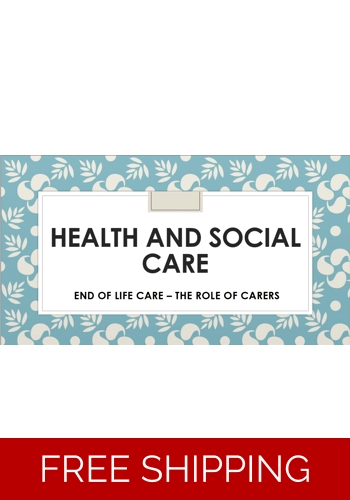End of Life Care - Role of the Carer
End of Life Care - Role of the Carer Health and Social Care Training Resources
Presentation, handout and end of session assessment. All files editable.
Aim: The Role of Carers in the End-of-Life Journey
Learning Objectives:
1. Understand the role of carers in the end-of-life journey, including family members, healthcare professionals and volunteers.
2. Know the responsibilities and duties of carers.
3. Recognise the emotional and psychological impact of care giving and its importance in the well-being of both the patient and the carer.
4. Identify effective communication strategies and approaches to establish trust and rapport with the patient and their families.
PowerPoint Presentation (66 slides)
Aims and Objectives
Introduction
Section – Role of Caregivers
Role of Carers
Personal Care
Pain and Symptom Management
Emotional Support
Companionship
Facilitating Communication
Advocacy
Respecting Wishes, Promoting Dignity and Autonomy
Creating a Comfortable Environment
Grief Support
Cultural and Spiritual Sensitivity
Record Keeping and Documentation
Advance Care Planning
End of Life Education and Training
Conclusion
Section - Emotional and Psychological Impact of Care
Introduction
Emotional Strain
Burnout and Exhaustion
Grief and Anticipatory Grief
Feeling Overwhelmed and Social Isolation
Impact on Mental Health
Role Strain, Loss of Identity
Financial Stress, Impact on Relationships
Conclusion
Section - THE WELL-BEING OF PATIENT AND CARER
Introduction
For the Patient – Enhanced Emotional Comfort
For the Patient – Dignity and Respect
For the Patient – Improved Quality of Life
For the Patient – Sense of Security
For the Carer – Reduced Burnout and Stress
For the Carer – Improved Mental Health
For the Carer – Enhanced Coping Skills
For the Carer – Continued Commitment to Care
Mutual Benefits
Conclusion
Section - Effective Communication Strategies and Approaches to Establish Trust and Rapport
Introduction
Active Listening
Open and Honest Communication
Collaborative Decision Making
Empower Decision-Making
Use Plain Language
Ask Open Ended Questions
Be Respectful of Cultural and Spiritual Beliefs
Provide Emotional Support
Be Patient and Allow Silence
Offer Continuity of Care
Co-Ordinated Family Meetings
Non-Verbal Communication
Supportive Literature
Conclusion
Recap
References and Further Reading
Word Documents
Handout and End of Session Assessment
HSC Training Link
Training Resources for Health and Social Care
Supplying training resources for the health and social care
sector since 2004.
Resources purchased are emailed to you via
Zip Folder attachment.
All packs are written in a generic style and can easily
be adapted to suit your own specific training delivery.
Resources are Microsoft Office based.
Secure payments via PayPal Merchant Commerce Platform.
You do not need a PayPal account to use this payment
gateway.
Debit and credit card payments accepted.





